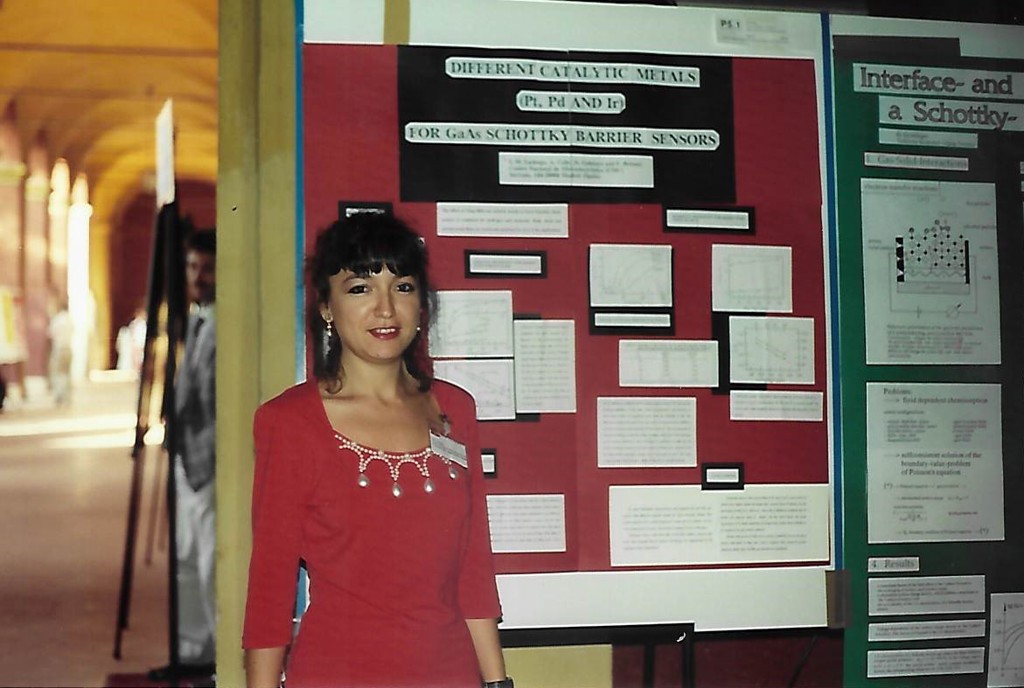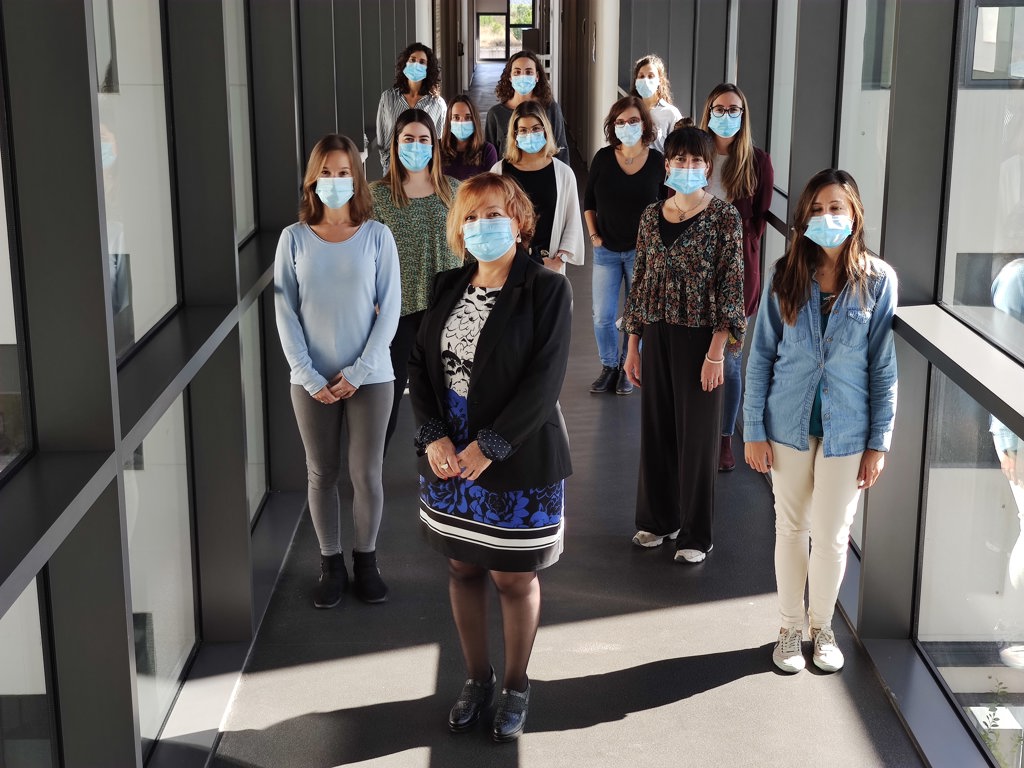Undefeated
About Optica
21 March 2023
Undefeated
How a Spanish scientist overcame sexism to become a global expert in optical biosensors

Laura Lechuga in her lab, 2022
In 1985 Laura Lechuga had just completed her bachelor’s in chemistry and applied for a summer internship with an oil company in Cadiz, Spain. She was excited to put her new degree and expertise to use until the interview left her speechless. “I was young, enthusiastic, and thoroughly prepared. Then a hard reality hit me.” Three middle-aged men sat on the interview panel and asked their first question. ‘Do you have a boyfriend?’ “I thought I was there to talk about science, my scores, or what I could bring to the company. Nothing could have prepared me for this kind of attitude. This was my first encounter with sexism." Their second question hit even harder. "Then they asked, 'are you planning on having a baby soon?'” Lechuga was so shocked she could not find the words to respond. "Eventually, they gave the position to a man from my university with a weaker CV. I feel I didn’t get the job because I was a woman.”
“It was a hard lesson. Until then, my only competition had been from female classmates in our strict religious school. It was a real surprise to experience these attitudes. But I would not let it defeat me.”

Young Laura Lechuga with her mom and brother in Cadiz.
Lechuga developed her grit and passion early in her native Andalusia. “Life in Andalusia was not about making money. It was not a material life. We had a different mentality. We were home to Spain's famous Flamenco culture, where the ethos was to enjoy life today because we might die tomorrow.” Lechuga was taught by nuns in an all-girls school where they instilled strong values of hard work, discipline and perseverance. She took these to heart and excelled, even though Cadiz was full of distractions. “There were always celebrations: Carnival, Easter, Christmas; flamenco festivals every weekend through May and June. It was difficult to get any work done at all!"
Lechuga hoped to study mathematics at university, but Cadiz University didn’t offer it as a major. “My family could not pay for me to study further afield, so Cadiz University was the only place for me. I took chemistry because, of the available options, it was the most appealing to me. I was determined to succeed. Whenever life presented hindrances, I always reverted to my guiding principles of doing my best with what I had and overcoming obstacles to the best of my ability. I told myself I'd get through chemistry now and probably change later when I got a Ph.D."
"I always reverted to my guiding principles of doing my best with what I had and overcoming obstacles to the best of my ability"
After she completed her undergraduate degree, Lechuga stayed at Cadiz University to pursue a PhD in chemistry but soon realized she wasn’t satisfied. “I got as far as I could with my PhD project, but I realized the project was not innovative enough. It was boring, and the guidance I got was minimal.” Lechuga tried to transfer to a different research group within the university without success. “Nobody wanted to help me. I’d try to speak with professors but I always got the same reply: ‘it’s your problem.’ I felt brushed aside.” The experience motivated her to seek out new opportunities to further her academic curiosity outside of Cadiz.
In 1998, Lechuga was accepted into a Ph.D. program at the Microelectronics National Center (CNM) – now called the Instituto de Micro y Nanotecnología (IMN) – a research institute belonging to the Spanish National Research Council (CSIC). “I felt at a disadvantage as it was a center dedicated to microelectronics, and everyone did physics or telecoms. I was the only chemist and knew nothing about semiconductors.” Always up to a challenge, Lechuga got to work and soon held her own with the physicists. Her director of studies then suggested she open a new research line. "I began researching a then-novel technology called biosensors – small devices used to measure chemical or biological reactions and then generate a signal.”
"I discovered something even more powerful than biosensors: I fell in love with optics."
Lechuga’s next role postdoctoral researcher at the MESA Research Institute at the University of Twente in the Netherlands was even more life-changing. “I discovered something even more powerful than biosensors: I fell in love with optics. With this technology, you can achieve very sensitive and powerful biosensor devices that can be employed for many different applications. Suddenly I wanted to know everything there was to know.” Lechuga completely retrained in optics, plasmonics and silicon photonics, cleanroom fabrication and optical biosensors. By 1995, she was firmly established as an expert in optical biosensing and returned to CNM in Madrid to become a scientific researcher and eventually a full professor.
In 2004, Lechuga branched out as an entrepreneur with her first spin-off company, SENSIA, SL. It was an engineering company making portable, handheld plasmonics sensors solutions for detecting pollutants and biomarkers in fluids, which was later acquired in by a large industrial Spanish group. In 2008, Lechuga became Full Professor and Head of the Nanobiosensors & Bioanalytical Applications Group at the Catalan Institute of Nanoscience and Nanotechnology (ICN2) in Barcelona. Lechuga and her team began integrating plasmonics and silicon-based biosensors into portable lab-on-a-chip platforms to apply them in clinical and environmental diagnostics.
Lechuga’s achievements in optics and photonics quickly gained recognition in Spain and worldwide. In 2014 she was elected as a Fellow of Optica (formerly OSA), and two years later in 2016 received the Physics, Innovation and Technology Award from the Royal Spanish Physics Society (RSEF) and BBVA. In 2020, she received the Ada Byron Award for Technologist Woman, the Rey Jaime I Award for New Technologies and the Juan de la Cierva National Research Award—the most prominent awards a scientist can receive in Spain. Lechuga attributes her success to more than hard work. “Working hard is obvious, but most importantly, you need a strong will and a strong character. You need to combine all these things. You need to be able to confront people and contest what they say when they challenge you.”
"Early in my career, there was no support, so I was determined to get through on my own. All those experiences have given me the strength and knowledge to help other young women in science. "
In early 2020 when COVID-19 was spreading around the globe, the European Commission (EC) launched an emergency fund to develop photonics technologies to tackle the pandemic. Lechuga and her team of researchers had already developed an interferometric nanobiosensor to examine bacterial infections or cancer biomarkers. “We knew our technology could be modified to detect early, low viral load cases. My colleague, Dr. Jordi Serra-Cobo, an eco-epidemiologist researcher from the University of Barcelona, worked on the surveillance of coronaviruses in animal reservoirs for many years. He often suggested that we should work together on a project. So when we saw the Express Call for proposals, I telephoned him and said, ‘now is the time to work together.’” They formed the Combating 2019-nCoV: Advanced Nanobiosensing platforms for POC global diagnostics and surveillance – or ‘CoNVat’ consortium.
Lechuga’s team created a new point-of-care detector to sense molecules and virus antigens using miniaturized chips – or nanophotonic biosensors– from a simple nasal or saliva swab. Their sensor proved more reliable than several existing tests: The CoNVaT sensor was more effective than the rapid “finger-prick” kit, which can detect if a person had the coronavirus before and has since recovered. It was also more accurate than an immunochromatographic lateral flow assay (LFA) test, which can deliver results rapidly but with low sensitivity.

Lechuga signs her book Una Cientifica Saltando Vallas (A Female Scientist Jumping Fences), at the Madrid Book Fair (2021)."
In a week, Lechuga and her team assembled a consortium of four partners and wrote a successful proposal to the EC. “After it was approved, we received incredible media attention. I was contacted by the Spanish Minister for Science and Innovation and invited onto TV and radio talk shows." The success of CoNVaT significantly raised the profile of Lechuga and her team. According to Analytical Chemistry Magazine, extensive serological testing using their research has occurred in two hospitals in Barcelona – the Val d’Hebron University Hospital and the Clinic Hospital of Barcelona. Their detector was able to conduct a sample reading in as little as 15 minutes from preparation time to delivery. Today, their work continues as they extend their biosensor technology to detect infectious bacteria and monitor the presence of different coronavirus strains in animals.

Laura Lechuga (2022)
Lechuga is channeling her energy to more than her optical biosensing projects: she is also committed to helping young female scientists build successful careers. In her 2021 book Una Cientifica Saltando Vallas (A Female Scientist Jumping Fences), she says “My road was not easy: no one gave me anything. Instead on many occasions, they tried, in various ways that were ultimately futile, to push me aside, leave me behind, and dismiss me, just because I was a woman.” She wrote the book to share her hard-earned wisdom and encourage women to overcome obstacles in their pursuit of science. "Early in my career, there was no support, so I was determined to get through on my own. All those experiences have given me the strength and knowledge to help other young women in science. There are so many challenges for women today. One of the greatest difficulties is combining personal life, children, a home and an academic career. As there are few female group leaders, it’s not easy getting the targeted, insightful advice and encouragement needed to build a successful career. Progress for women is happening at the moment. When I started my Ph.D. in the 80s, I thought things would change in ten years. Forty years on it is starting to change, but not as fast as I anticipated. The wheels of progress turn slowly, not only in science but in many areas of society.”
The Optica Community unites a diverse, global population of students, scientists, engineers and professionals. We invite everyone in our community to forge the connections vital to solving societal challenges through light science and technology.
Media Contact


